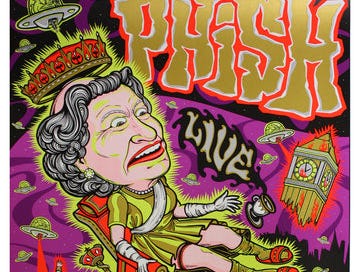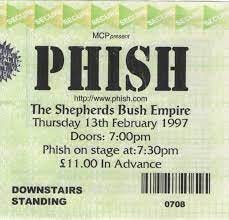SET 1: Chalk Dust Torture, Wolfman's Brother > Also Sprach Zarathustra > Stash, Walfredo, Taste > Waste > Poor Heart > Character Zero > Peaches en Regalia, Love Me, David Bowie
SET 2: Julius, Cars Trucks Buses > My Soul > Punch You in the Eye > Jam > Slave to the Traffic Light > When the Circus Comes > Maze > Rock A William, Harry Hood > Frankenstein
ENCORE: Prince Caspian > Johnny B. Goode
What a difference six weeks/3,000 miles/-90% makes. Phish took an uncommonly short break from the road in the 96 to 97 transition, only spending 43 days at home before getting right back on stage for their first February shows since 1993 and the last until 2003. They also went abroad to Europe for the second time in less than a year, this time without the handicap of playing most dates in front of the semi-hostile audience of a bigger, older act. With New Year’s Eve at the massive Fleet Center still a fresh memory, they kicked off 1997 at a club that holds a mere 2,000 fans – a tenth of the size of the Boston arena.
That confluence of unusual and abrupt shifts produces a band that sounds immediately refreshed. It’s hard not to be influenced by the hallowed digits of “97” appearing in the dateline. But even if we’re several months away from the music that built the year’s considerable reputation, there’s still an added shine to this show. Say what you will about 1996 (and I said a lot of what I willed), but the Phish we hear at the Shepherds Bush Empire sounds exponentially more relaxed than their first headlining gig at the venue, or all of Europe ‘96 for that matter. But it also sounds more chill than even the band playing to their core fanbase on 12/31/96, or the band that occasionally labored its way across the United States in the Fall of 1996, unsure of where their next step lay.
Back at the start of the New Year’s Run, I posited that the band had determined what it wanted to workshop, but put those goals on the backburner for the high-profile holiday shows. The small, out-of-the-spotlight venues of Europe were the perfect laboratory for those experiments, and London comes out of the gate with plenty of projects. There are new original songs, new covers, suggestive song choices, and even an unusual jam that lay down the foundation for the legendary year to come.
Tonight, the most telling sign that Phish is ready to woodshed are those two original debuts. Both Walfredo and Rock A William codify the rotation jam goof-offs of the last couple years into actual songs — well, “songs” in the loosest sense. Walfredo, a sentimental remembrance of one of Santana’s many percussionists, puts Fish on bass, Mike on guitar, Trey on piano, and Page on drums. Rock A William, an ominous tale from their first Colorado trip, is played by Fish on guitar, Mike on piano, Trey on drums, and Page on bass.
They are very silly songs. But first and foremost, they’re meant to be icebreakers. “It’s a struggle for Phish to write songs together,” Trey says in The Phish Book. “Before leaving for Europe, though, we said: ‘Damn it, we’re going to write together no matter how it comes out.’”
It’s a method common to any creative profession: when you’re stuck in a rut, change your environment. Phish took that advice to an extreme, swapping instruments and trading their natural virtuosity for unashamed amateurism — look no further than Fishman’s guitar squeals in Rock A William, or Page’s beginner’s-class Walfredo drums. It’s also an exercise in empathy, from a band that has prioritized listening to each other since the very beginning — a graduate-level version of the “hey hole” practice game. It’s one thing to hear another instrument and tailor your own playing to complement it, and another to actually spend some time writing and performing on that instrument yourself. Trey in The Phish Book again: “We constantly reexamine our roles and try to figure out ways to break out of them. That’s why we switch instruments…”
But again, these songs are ridiculous. Walfredo sounds a bit like a lost 70s TV show theme, with a chipper piano part and abundant harmony vocals. Thanks to the rhythm section of Fish Bass and Page Drums, it wobbles like a warped record, though Mike gets a chance to show off his capable guitar skills, even taking a short solo. Rock A William transforms the band’s raw skills into something sinister, and again it’s Mike who proves his versatility with some bluesy, minor-key piano fills. Lyrically, both songs are full of inside jokes and self-references: the Burlington club Hunt’s, a cad nicknamed “Timber Ho,” a Colorado show “when Fish played the vacuum, and ruined your set,” — Walfredo even references Rock A William. They’d soon be joined by Carini for a trio of observational storytelling songs emphasizing that Phish are a) weirdos and b) surrounded by weirdos.
Unlike Carini, Walfredo and Rock A William would disappear rapidly; the majority of performances for both songs will come in these next two weeks in Europe. But they did what they were intended to do, sparking one of the peak eras of Phish songwriting, both communal and classical. Eight of the 14 songs on Story of the Ghost — many of which debuted in 1997 — will be Anastasio/Fishman/Gordon/Marshall/McConnell compositions. Trampled by Lambs and Pecked By The Dove, a journal of Trey/Tom demos from 1997, chronicles another 25 songs that would anchor the rest of the decade. After a year in which only 6 new Phish songs debuted, the logjam is officially broken.
You can’t separate that songwriting flood from Phish’s improvisational development in 1997. By the end of 1996, it was clear that the band wanted to cultivate a new, more collective jamming style, but trying to do so in old songs with years of old habits proved frustrating. A new crop of material (plus some unshelved songs, such as Wolfman’s Brother, revived with new purpose) lowered the resistance. You can already hear hints of it in this show; in the atmospheric jam between PYITE and Slave, or the way Maze noisily disintegrates into Rock A William instead of following its usual blueprint. Absurd as it might seem, there’s a straight line from Fishman’s godawful guitar licks to the Denver Ghost, the Palace Tweezer, and all points beyond.





FYI, "Timber Hole" is the nickname for Tim Rogers, the original Phish lighting director
…and we’re back! Very excited to be here , thanks for your work sir, as always.